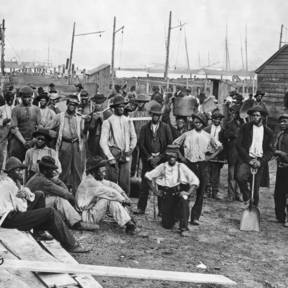On other people’s freedom – Kevin Young in NYT:
‘What Juneteenth and other Emancipation days commemorate is both the promise of freedom and its delay. For June 19, 1865, doesn’t mark the day enslaved African Americans were set free in the United States but the day the news of Emancipation reached them in Texas, two and a half years after the Emancipation Proclamation. It is a holiday ringed, like a good brisket, though not in smoke but irony. Out of such ironies Black people have made the blues, made lemonade, made good. The lesson of Juneteenth is both of celebration and expectation, of freedom deferred but still sought and of the freedoms to come.
My Louisiana-born mother recalls celebrating Juneteenth as a child, eating homemade ice cream her grandfather made special for that day; he filled the icebox and let her know that freedom was what she was tasting. The day must have been all the more poignant for him, born in 1870, as his mother was enslaved. For decades, other emancipations — including one honoring the Emancipation Proclamation, on the eve of the New Year — have been marked by African Americans with parades, oratory and “Lift Every Voice and Sing.”’
(…)
‘Against that backdrop, I am reminded of a question I have been asked a lot lately in the run-up to the holiday: Should Juneteenth become a national holiday, as our elected officials just decided it should? I believe the answer is yes — but there remains a caveat, and another question. When Juneteenth becomes a national holiday, will it still remain Black? Can it be both serious and playful, and recognize, as the poet Toi Derricotte reminds us, that “joy is an act of resistance”? Can we cook and laugh while we remember, remaining rooted in tradition while telling the full story of America and Black life in it? I believe in an America that can do all of those things. When we know and accept the unvarnished truth — in all of its complexity, conflict and context — it can change how we view things, including ourselves. The National Museum of African American History and Culture, an institution I have the privilege of leading, is proof of that. In chronicling the American story through the lens of African Americans across the centuries, the museum has drawn large crowds of all races. We at the museum are keenly aware that history should not just be a record of what happened. It should also be a record of how we remember what happened — and how too often memory and testimony have been elided in favor of fear and fantasy.’
(…)
‘Like Juneteenth, that soaring space on the National Mall — which took over a century after it was first proposed to build — reminds us that freedom is not free. More than that, as Toni Morrison put it, “the function of freedom is to free someone else.” Juneteenth tells us that a fuller future awaits, and the work of collective freedom is ongoing.’
Read the article here.
It’s a noble endeavor, to free someone else. But the question remains whether you should free people against their will. The relationship between the liberator and the person being liberated is a relationship between a subject and an object.
And yes, ‘memory and testimony have been elided in favor of fear and fantasy.’
Official remembrance has always been at least party an attempt at mythologizing the past. There are exceptions.
For example, the famous speech by German president Richard von Weiszäcker in 1985.
See here.
The past: fear and fantasy.
The future: more fear and more fantasy.
The present: trying to escape.
And the collective freedom? Yes, it is ongoing. Very much so. But since freedom is one of those often used and abused words, we should also try to establish what exactly we mean when we utter the other F-word.
